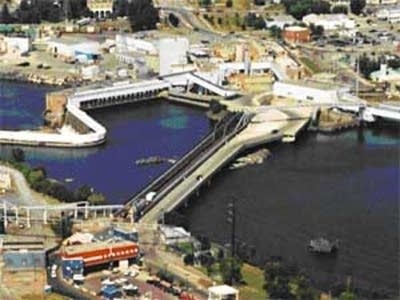Americans entering the U.S. now need passports
Go Deeper.
Create an account or log in to save stories.
Like this?
Thanks for liking this story! We have added it to a list of your favorite stories.

Hundreds of thousands of vehicles cross the border in International Falls each year. All that traffic is good for business in town. The big question now is whether stricter travel rules will mean fewer visitors.
"There's still some question about that, that it could slow down some of the tourism traffic," said Betsy Jensen, president of the International Falls Chamber of Commerce. "There is definitely concern that people will not want to deal with that hassle. Now I guess that really remains to be seen."

The tighter border security is in response to the Sept. 11, 2001 terrorist attacks.
The passport rules were supposed to take effect last year, but thousands of communities along both sides of the border, including International Falls, fought hard to oppose it. They worried the $100 cost for a passport was too expensive for travelers.
Turn Up Your Support
MPR News helps you turn down the noise and build shared understanding. Turn up your support for this public resource and keep trusted journalism accessible to all.
The delay paid off. The federal government came up with an alternative -- a secure passport card that's half the cost of a regular passport.
The card can't be used for international air travel, but it works for land border crossings or sea ports-of-entry in the Western Hemisphere.
Jensen says the cheaper document may help keep visitors flowing to International Falls.
"We're looking for it to be fairly seamless, honestly. The government has done a very good job of letting people know that you've got to have this stuff."
"We're looking for it to be fairly seamless, honestly," said Jensen. "I think the government has done a very good job of letting people know that you've got to have this stuff and they've been talking about this for a couple of years."
In Minnesota, more than a million of the new, cheaper passport cards have been issued since they became available in early 2008.
Kids under 16 years old don't need a passport document. They'll still be allowed to cross the border with just a birth certificate.
For locals in International Falls, cross-border travel is essential. Many visit neighboring Fort Frances, Ontario routinely to work, shop or visit relatives.
People who live in border towns have another travel document option. The NEXUS card is for trusted travelers who pass a background check by both the U.S. and Canadian governments. NEXUS cards, however, can't be used for travel to other places.
People have swamped the Koochiching County office applying for passports or passport cards, according to county recorder Pam Rooney. A few years ago Rooney might get only a couple of applicants every few days. But since last year, she's processed more than 2,000.
Getting a passport card takes four to six weeks. Rooney says there's been a big rush of applicants in just the past month.
"I think a lot of them weren't too happy about it and just waited until the last minute, and now they realize they can't get across at all without it, and so they are breaking down and getting it," said Rooney. "You know, not everyone is upset about it, but some just procrastinated."
Homeland Security officials say, for now, U.S. border agents won't turn people away if they don't have a passport. It's unclear how long that grace period will last.
Acting International Falls port director Marty Eide, says staff will deal with non-compliance on a case-by-case basis.
"We're going to take a common sense approach to it," said Eide. "You know, a family coming up for a fishing trip and who have applied, or have some documentation explaining what they're doing and are just not aware of it, we're going to give them what we call our tear sheets and say, 'This is what you're going to need, you know. There's no penalty at this time, but down the road, you're going to need this to cross the border.'"
This month is typically the busiest time for cross-border travel in International Falls. It's when thousands of Minnesotans head north to fish in Ontario.
In the past, that's often meant several-hour waits in lines up to six miles long. Border officials say because passport documents can be scanned by a computer, those lines will probably move a lot quicker.




